
The most valuable possession you can own…


“Who could have dreamed in 1965 that the alternative society would eventually multiply to such extraordinary proportions that it becomes our mainstream.”
Bill Graham
excerpted from http://www.billgrahamfoundation.org
For thirty years, Graham never stopped raising money for dozens of causes, ranging from AIDS research to the Haight Ashbury Free Medical Clinic, Amnesty International to the San Francisco Mime Troupe. Graham never seemed happier than when he was harnessing the tremendous power of rock & roll for the good of a cause. He truly seemed to delight in bringing together the biggest names in pop music to help make the world a better place, while at the same time making himself just a little bit more legendary.”
— Michael Goldberg, Rolling Stone, December,1991
“Our days are numbered. One of the primary goals in our lives should be to prepare for our last day. The legacy we leave is not just in our possessions, but in the quality of our lives. What preparations should we be making now? The greatest waste in all of our earth, which cannot be recycled or reclaimed, is our waste of the time that God has given us each day.”
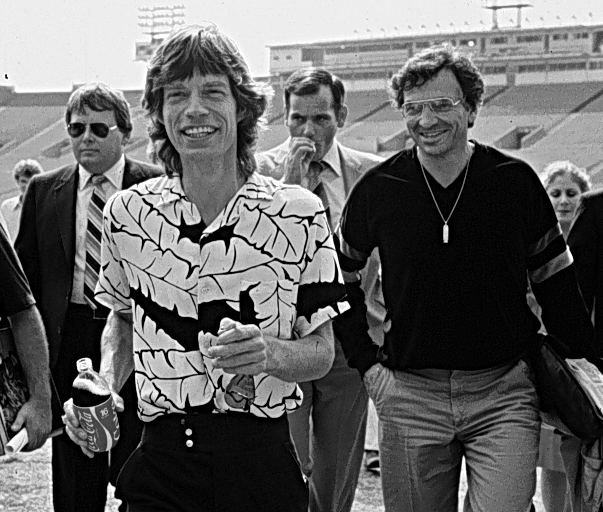
Bill Graham and Mick

 Bill and Janis
Bill and Janis
 Bill and Keith Moon
Bill and Keith Moon
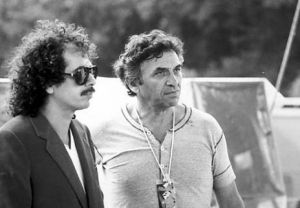 Carlos Santana and Bill Graham
Carlos Santana and Bill Graham
 Paul Kantner, Grace Slick, Bill Graham, Jerry Garcia
Paul Kantner, Grace Slick, Bill Graham, Jerry Garcia
Bill Graham was an American impresario and rock concert promoter from the 1960s until his death in 1991 in a helicopter crash. He fled from Germany and, in 1941, from France to escape the Holocaust. At age ten he settled in a foster home in the Bronx, New York.
“The classical artist must respectfully recreate the composer’s meaning. Although, with jazz music, you are allowed to develop your own creativity, improvisation and expression. This greatly inspires me.”
“The music is within your heart, your soul, your spirit, and this is all I did when I sat at piano. I just go within.”
Alice Coltrane
 Alice Coltrane & Swami Satchidananda
Alice Coltrane & Swami Satchidananda
“One night I was layin’ down,
I heard Papa talkin’ to Mama,
I heard Papa say to let that boy boogie-woogie.
‘Cause it’s in him and it’s got to come out.”
“I like dropping into a small club and playing with some people, trying to help them get a start.”
“I just get an idea and then all of a sudden I’ve got a song.”
“I do benefits. I do them all the time. There’s so many people out there that need help that I can’t say I won’t help them.”
“I’ve got enough money to live me two lifetimes so I don’t have to do nothing I don’t want to.”
“I never was a person for copyin’ people. I like to be John Lee Hooker.”

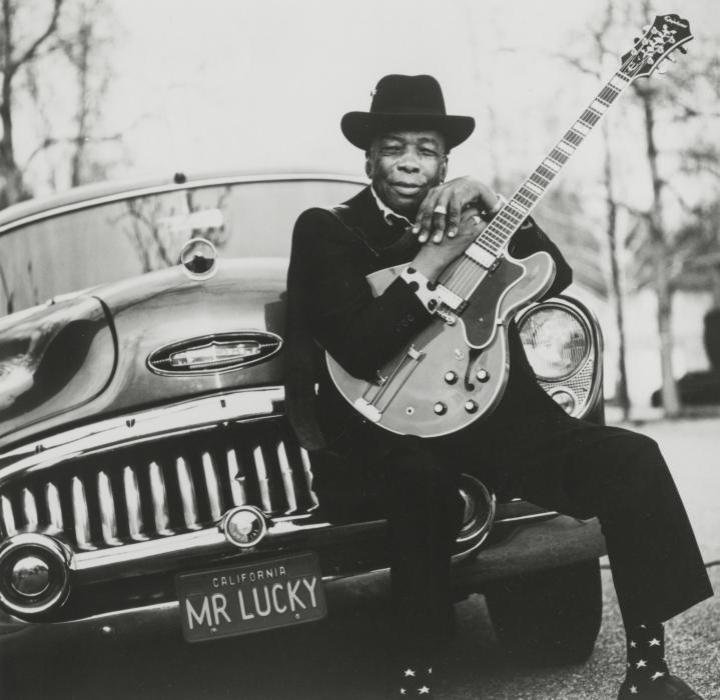 John Lee Hooker (Aug. 22, 1917 – June 21, 2001)
John Lee Hooker (Aug. 22, 1917 – June 21, 2001)

Photo by Michael Mendelson


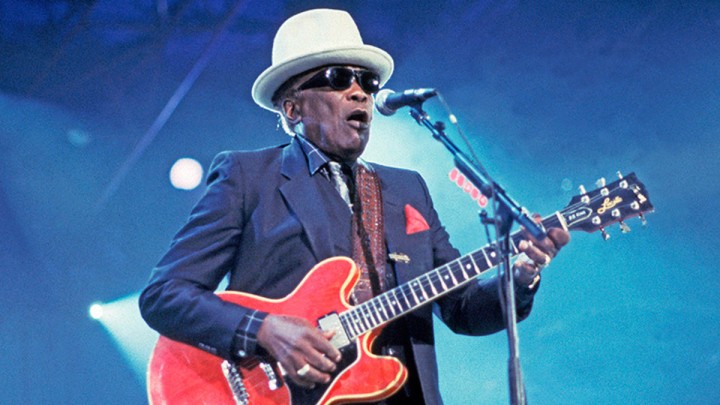


Bonnie Raitt and John Lee
 John Lee and Keith Richards
John Lee and Keith Richards
John Lee Hooker’s date of birth is a subject of debate; the years 1912, 1915, 1917, 1920, and 1923 have all been suggested. Most official sources list 1917, though at times Hooker stated he was born in 1920. Information found in the 1920 and 1930 censuses indicates that he was actually born in 1912. (Wikipedia)
One day there will be no borders, no boundaries,
no flags and no countries and the only passport will be the heart.
There’s only one truth on this planet: that we are all one. What I’d like to do before I die is bring people closer to the same reality that John Coltrane and Bob Marley were trying to bring people to-a reality of no borders, one race, one body-where we all take responsibility that nobody starves to death tomorrow morning. To do that with music is more important than becoming Jimi Hendrix or Beethoven. When you connect with people through music, you affect the whole wheel of life in such a way that, even though you are only one person, you make a difference, like Martin Luther King Jr. or Mahatma Gandhi. Then songs become windows for people to look inside or look outside. That’s why we love Jimi Hendrix – because his songs are beautiful windows. When we look through them, we like what we see.
Music, more than almost anything else, has the power to bring people together-people of different ages, races, religions. So I’m more clear now as to why I play. It’s not just to make people happy or to make them dance-it’s to change things: change myself, change the people in my band, change people all over the world, so we can have a clearer vision about life and about ourselves, so we can bring more harmony to the world.
http://www.scu.edu/ethics/architects-of-peace/Santana/essay.html
Hold up the light
The illusion of darkness is screaming
Fear brutality violence separation cruelty
The reality of love Whispers
Love compassion gentleness forgiveness compassion
Weapon of mass compassion
Brings healing restoration transformation and peace
Hold up the light
Illumine shine bring clarity
light the way to world peace
Think say and do light- love only
Peace
(thank you Steve G.)

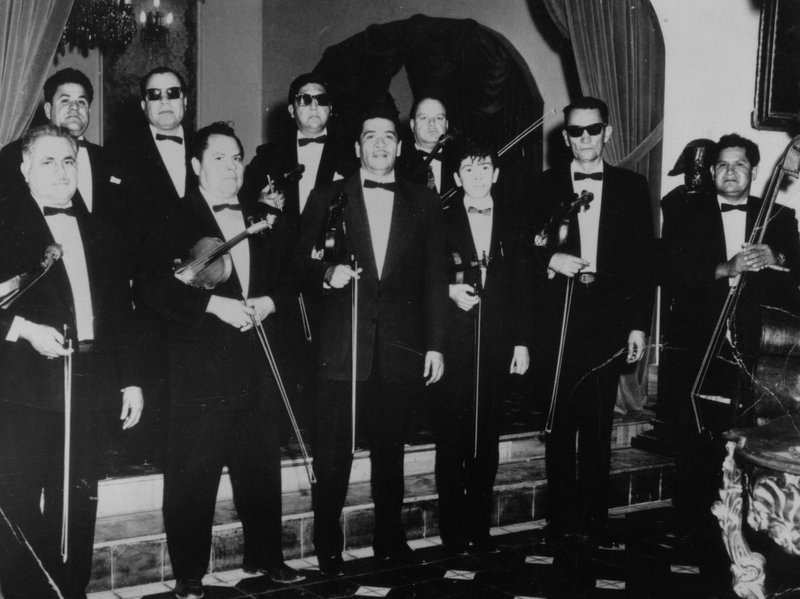
Carlos Santana at one of his first gigs with his father, a 50th anniversary party in Tijuana in 1958.



He said he always wanted to follow his heart.
He was born in Autlán de Navarro, Jalisco, Mexico. His father played the violin in a mariachi band. At the age of 5, he too would play the violin. But, by the age of 8, he wanted to play a new instrument, a guitar.
The family was so poor that his father would send the boys out to sell Chiclets and spearmint gum on the street, even shine shoes. The young boy would also play Mexican folk songs for fifty cents a song.
After his family came to America, he started saving his money to buy a guitar. One day, he found out his mother had used that money to pay for the immigration papers, their rent, and to fix his sister’s molars. He was so angry, he went back to Mexico. His mother and his brother had to literally kidnap him and bring him back to America.
His mother used to say, “I know we’re poor but we’re not going to be dirty.”
Eventually, he got his guitar. But, living in a small house, with seven kids sharing two bedrooms, there was bound to be conflict. He would return home one day to find out that his brother’s friend accidentally sat on his guitar, breaking it into two, which got the two brothers into a fight.
The next day, however, when he came home from school, there was a new white Gibson Les Paul guitar waiting for him. His brother got him a new guitar. “I broke down, man,” he remembers. That’s what family was like, you go through stuff, but, in the end, you stick together.
Influenced by B.B. King, T-Bone Walker, Javier Batiz, and John Lee Hooker, he continued playing the guitar. He would say, while playing his guitar, “Sometimes words get in the way. But when you go . . . [playing some beautiful high, fluid notes] – Palestinian, Hebrew or Aborigine or Mexican or Chinese, this speaks really clearly.”
He eventually quit his job washing dishes at a diner and decided to become a musician full-time. At first, it was difficult for his mother to understand, telling him, “Mijo, you know this, why you going this way? Musically why does it have to be so extreme and I said mom, ‘even I don’t know all I know that I have to follow my heart.’
He continued following his heart.
Fifty years ago, he followed his heart to a dairy farm in a small town in New York.
By this time, he had his own band, and, he was invited to perform, even though his band hadn’t even released their debut album and very few people knew him or his band.
It was August 16, 1969. It was the second day of Woodstock.
By the time they completed their set, they were one of Woodstock’s breakout acts.
Carlos Santana would be named one of the greatest guitarists of all time, but he would also be a voice for civil rights, speaking out on immigration issues, saying, “One day there will be no borders, no boundaries, no flags and no countries and the only passport will be the heart.”
He says that when he was growing up “watching B.B. King and Tito Puente and Miles Davis and Coltrane, everybody, Marvin Gaye, Jimi. And at the same time, with my left eye I was watching Dolores Huerta, Cesar Chavez, Martin Luther King, Malcolm X, Mother Teresa.”
He said (in Rolling Stone), of his appearance at Woodstock 50 years ago, “Woodstock . . . was more of a spiritual celebration. Woodstock signified the coming together of all the tribes. It became apparent that there was a lot of people who didn’t want to go to Vietnam, who didn’t see eye to eye with Nixon and none of that system, you know? The people who started that movement in Haight-Ashbury taught me the difference between deals and ideals, between artists and con artists. They were not phonies . . . The real people were wonderful. You could see American Indians and white people in love with life. Woodstock was a part of that. It was the same movement that got people out of Vietnam and got Nixon out of power.”
After the state of Georgia passed a law targeting immigrants and the Latino population of the state, Santana would be booed for appearing at the Atlanta Braves’ Civil Rights game after he told the audience, “This law is not correct. It’s a cruel law, actually, This is about fear…I am here to give voice to the invisible…this is the United States the land of the free…This is about Civil Rights.”
“Peace has never come from dropping bombs,” he said. “Real peace comes from enlightenment and educating people to behave more in a divine manner.”
“In 1969, I witnessed that humans are capable of not living with fear and needing a wall. There was no religion. There was no politics. There was no Democrats or Republicans. All it was, was humans taking care of one another, sharing granola or whatever we had. And it worked. It became a mystical event,” he said in the Toronto Sun.
He added, “Woodstock signifies that we can coexist with unity and harmony with grace and elegance and yeah, being funky too.”
In an interview with PBS, he said, “If people want to say oh they’re freaking hippies man they get on my nerves. Well you know what, we were so glad that you were not at Woodstock, because at Woodstock whatever we had, we shared it. And if you feel that hippies are like Kumbaya, bunch of, or whatever. It’s OK you keep yourself with that frequency. Mahatma Gandhi or Martin Luther King or you know all the guys who people call Kumbaya people you know they’re my heroes. Kumbaya.”
He would also say, “The most valuable possession you can own is an open heart. The most powerful weapon you can be is an instrument of peace.”
You must be logged in to post a comment.